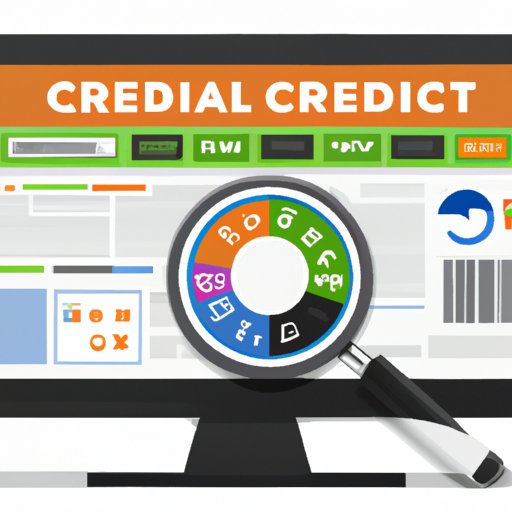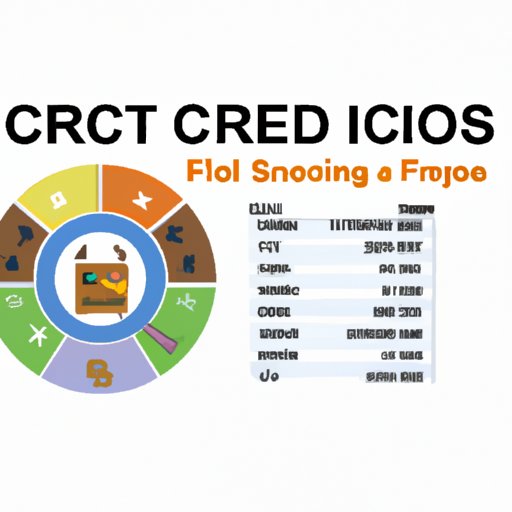Introduction
Your FICO score is an important measure of your creditworthiness. It’s used by lenders and other financial institutions to determine whether you qualify for a loan or line of credit. Knowing your FICO score can also help you make better financial decisions and get approved for favorable interest rates.
In this article, we’ll explore how you can get your FICO score. We’ll look at the factors that impact your score and provide tips for monitoring it. Let’s get started.
Research the Factors That Impact Your FICO Score
Before you can get your FICO score, it’s important to understand the factors that influence it. These include:
Payment History
Your payment history is one of the most important factors in determining your FICO score. It reflects how often you pay your bills on time and whether you have any outstanding debts. Late payments or missed payments can have a negative impact on your score.
Credit Utilization
Your credit utilization ratio is another factor that affects your FICO score. This ratio measures how much of your available credit you’re using at any given time. Ideally, you should keep your credit utilization below 30%. Higher utilization can lead to a lower score.
Length of Credit History
The length of your credit history is another factor that impacts your FICO score. Generally speaking, the longer your credit history, the higher your score. Having a long credit history shows lenders that you’ve been able to manage credit responsibly over a period of time.
Types of Credit Used
The types of credit you use can also have an impact on your FICO score. For example, having a mix of installment loans (e.g., car loans or mortgages) and revolving accounts (e.g., credit cards) can be beneficial. Having too much debt in one type of account can lower your score.
Recent Credit Inquiries
Finally, recent credit inquiries can affect your FICO score. When you apply for a new loan or line of credit, the lender may check your credit report. Too many inquiries within a short period of time can indicate that you’re taking on too much debt, which can lower your score.
Compare Different Credit Reporting Agencies
Once you understand the factors that influence your FICO score, it’s time to start researching different credit reporting agencies. Each agency provides a slightly different version of your credit report, so it’s important to compare them before choosing one.
Understand Their Coverage
First, you’ll want to understand the coverage of each agency. Some agencies only cover certain areas, such as the United States or Canada, while others provide more comprehensive coverage. Make sure the agency you choose covers the region where you live.
Review Their Accuracy
Next, you should review the accuracy of each agency’s reports. Check to see if they’re regularly updated and if they contain accurate information. You may also want to read customer reviews to get a better sense of the quality of their reports.
Consider Any Fees Involved
Finally, make sure to consider any fees associated with each agency. Many agencies charge a fee for access to your credit report, so it’s important to compare prices before making a decision.

Utilize Online Resources to Monitor Your Credit Score
Once you’ve chosen a credit reporting agency, it’s time to start actively monitoring your credit score. There are plenty of online resources that can help you do this.
Sign Up for Credit Alerts
Many credit reporting agencies offer free credit alerts that notify you when there are changes to your credit report. These alerts can help you stay on top of your score and take action if necessary.
Check Your Credit Report Regularly
You should also make it a habit to check your credit report regularly. Most agencies allow you to view your report for free once a year. Take the time to review your report and make sure all the information is accurate.
Resolve Any Errors or Discrepancies
Finally, if you find any errors or discrepancies on your credit report, take the time to resolve them. Contact the credit reporting agency to dispute any inaccurate information, and follow up to make sure it’s corrected.

Take Advantage of Credit Monitoring Services
Another way to monitor your credit score is to sign up for a credit monitoring service. These services can provide you with real-time updates on your score and alert you when there are changes to your credit report.
Choose a Service That Aligns with Your Goals
When choosing a credit monitoring service, make sure to select one that aligns with your goals. Different services offer different features, so think about what you need and pick the one that best suits your needs.
Get Real-Time Updates On Your Credit Score
Most credit monitoring services offer real-time updates on your credit score. This can help you stay on top of your score and take action if necessary.
Receive Notifications When Your Score Changes
Finally, some services also provide notifications when your score changes. This can be a useful tool for tracking your progress and staying informed about any changes to your credit report.

Consider Getting a Free FICO Score from Financial Institutions
Finally, some banks and credit unions offer free access to your FICO score. This can be a great way to keep track of your score without having to pay for a credit monitoring service.
Banks and Credit Unions Offer Free Reports
Many banks and credit unions now offer free access to your FICO score. Check with your bank or credit union to see if they offer this service.
Understand the Terms and Conditions
Make sure to understand the terms and conditions of any free FICO score offer. Some offers may require you to open an account or make a certain number of transactions in order to qualify.
Take Advantage of Other Benefits
Finally, take advantage of any other benefits your bank or credit union may offer. Some institutions offer discounts on loans or special offers for customers who have a good credit score.
Conclusion
Monitoring your FICO score is an important part of maintaining a healthy financial life. In this article, we’ve explored how to get your FICO score. We looked at the factors that influence your score, how to compare different credit reporting agencies, and how to utilize online resources and credit monitoring services.
We hope this guide has been helpful and that you now feel empowered to take control of your FICO score.
(Note: Is this article not meeting your expectations? Do you have knowledge or insights to share? Unlock new opportunities and expand your reach by joining our authors team. Click Registration to join us and share your expertise with our readers.)
